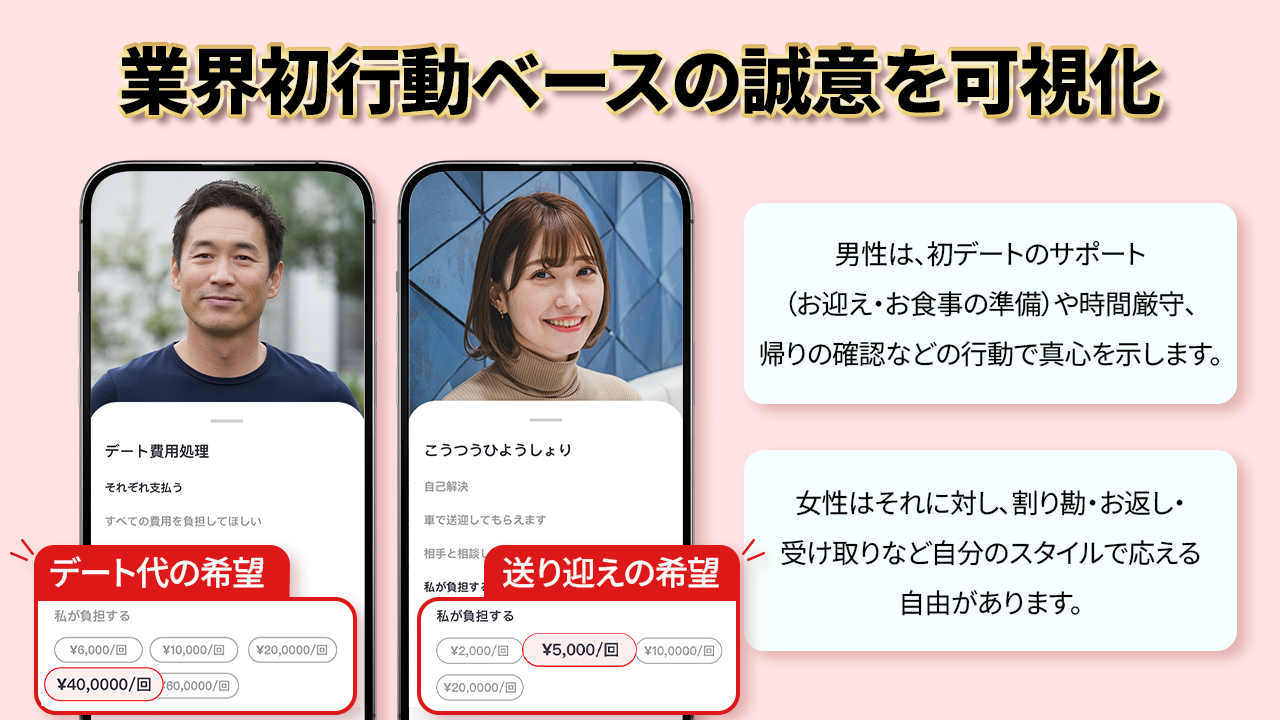「사시」を 초월하여: 의도적인 연애로 쌓아가는 깊은 신뢰 관계로 가는 길
「또 그 어색한 공기가…」。데이트 후의 메시지가 읽은 것으로 남아있다. 혹은 서로의 관계에 대한 인식에 미묘한「사시」가 생기고 있다는 것을 깨닫는다. 이런 모호한 경험은 없었나요? 현대의 연애에서는 서로의 의도나 본심이 명확하지 않은「사시」 상태가 불안이나 오해를 초래하는 원인이 되기 쉽습니다.
경쟁 분석에서 드러난「사시」라는 단어의 다의성(모호성)은, 많은 만남 서비스나 앱이 가진「의도의 불명확성」을 상징하고 있습니다. 서로가 무엇을 원하는지 모른 채 진행되는 관계는 시간과 마음의 에너지를 소모하게 됩니다. 이 글에서는 연애에서의 모든「사시」(모호함, 온도차, 의도의 불일치)를 극복하고 서로를 존중하며, 뜻을 나눌 수 있는 관계를 구축하기 위한 구체적인 생각과 단계를 소개합니다. 이것은 요이토키가 제안하는「의도적인 연애」에 대한 초대장입니다.
목차
- 우선 자신의「사시」를 명확히 하는 것부터 시작하자
- 대화로「사시」를 만들지 않기. 상호 이해를 깊이 하는 커뮤니케이션 기술
- 첫 데이트에서 차별화되다.「상호 노력」이 느껴지는 플랜 수립 방법
- 장기적인「궁합」을 판단하다. 가치관의「사시」를 맞추는 기술
- 자주 묻는 질문(FAQ)
- 결론
- 새로운 형태의 만남, 시작하지 않겠습니까?
우선 자신의「사시」를 명확히 하는 것부터 시작하자
건전하고 지속 가능한 관계를 쌓기 위한 첫 걸음은, 외부에 파트너를 찾는 것이 아니라 내면의 자신과 마주하는 것부터 시작합니다. 자신의 가치관과 원하는 관계가 명확하지 않다면, 상대에게 그것을 전달하는 것은 불가능합니다. 더구나 상대의 본심을 판단하는 것은 거의 불가능합니다.
자신이 진정으로 원하는 관계를 판단하기 위한「내면 점검」의 추천
연애에서의 자기 이해는 단순히「좋아하는 타입」을 생각하는 것이 아닙니다. 그것은 삶의 설계도를 그리는 작업과 유사합니다. 우선 아래와 같은「가치관 리스트」를 작성해 보는 것부터 시작해보세요.
- 인생에서의 우선순위: 경력, 가족, 취미, 자기 성장… 어떤 균형이 이상적입니까?
- 파트너십의 이상상: 매일 함께하고 싶나요, 아니면 적당한 거리감이 좋나요?
- 미래의 비전: 5년 후, 10년 후의 생활 모습은 구체적으로 상상할 수 있나요?
- 양보할 수 없는 고집: 종교관, 금전 감각, 거주지 등 절대적으로 타협할 수 없는 것은 무엇인가요?
이 내면 점검은 요이토키가 중요시하는「의도의 명확성」의 기반입니다. 프로필 작성 전 자기 내성을 촉구하는 우리의 접근은 단순한 만남을 위한 것이 아니라, 당신의 인생의 질을 높이기 위한 투자입니다.
파트너에게 전달해야 할 당신의「의도」를 언어화하는 연습
자기 이해가 깊어지면 다음은 그것을 언어로 변환하는 연습이 필요합니다. 많은 사람들이「이런 말을 하면 싫어할까봐」두려워하며 본심을 모호하게 한 채로 커뮤니케이션을 합니다. 그러나 진지한 관계를 원한다면, 오히려 반대입니다.
예를 들어,「결혼을 염두에 둔 관계를 원한다」라는 희망이 있다면, 그것을 직접적으로 전달할 용기를 가져야 합니다. 단, 전달 방식에는 배려가 필요합니다.「저는 미래에 결혼을 생각한 관계를 구축하고 싶습니다. 천천히 서로를 이해하며 그 가능성을 탐색해 나가면 좋겠습니다」와 같이, 강요가 아닌 대화의 계기로 제시하는 것이 이상적입니다.
과거의「사시」관계에서 배우다, 자신에게 있어 적신호・청신호
과거의 관계에서 느낀 모호함이나 실망은 귀중한 학습의 보고입니다. 그런 경험을 분석함으로써, 당신에게 무엇이 중요한지, 무엇이 허용할 수 없는지가 명확해집니다.
- 적신호(재발을 피하고 싶은 패턴): 연락이 불규칙하여 불안해졌다, 가치관의 차이로 빈번하게 충돌했다 등
- 청신호(다음에도 소중히 하고 싶은 요소): 의견이 달라도 이야기하며 이해할 수 있었다, 서로의 성장을 응원할 수 있었다 등
이 회고 작업은 요이토키의 철학인「감정적 평등」을 실현하기 위한 자기 훈련입니다. 자신이 존중받지 못하는 상황을 인식하고, 동시에 상대도 동등하게 존중하는 태도를 배우는 기회가 됩니다.
대화로「사시」를 만들지 않기. 상호 이해를 깊이 하는 커뮤니케이션 기술
자기 이해가 진행되면, 다음은 대인 커뮤니케이션의 질을 높이는 단계입니다. 여기서 중요한 것은「전달 기술」과「듣기 기술」의 균형입니다. 일방적이지 않고, 쌍방향의 대화를 통해 서로의 본심을 끌어낼 수 있는 관계를 구축합시다.
관계의 희망을 자연스럽게 전달하는, 배려 있는 말 걸기
자기 개방은 상대에 대한 신뢰의 증거입니다. 그러나 그것을 어떻게 전달할지가 중요합니다. 예를 들어, 교제의 초기 단계에서 향후의 희망을 전달할 경우, 다음과 같은 접근이 효과적입니다.
이상적인 말하기 예: 「서로의 페이스로 확실히 이해해가고 싶기 때문에, 천천히 진행할 수 있다면 좋겠습니다」 「저는 진지한 관계를 구축하는 것을 중요하게 생각하고 있으니, 그 점에서 생각이 다르지 않은지 말씀해 주시면 감사하겠습니다」
이런 전달 방식은 요이토키가 제시하는「상호 존중」의 기본입니다. 자신의 의견을 말하면서도, 상대의 생각에도 귀 기울이는 자세를 보임으로써, 대등한 파트너십의 토대가 구축됩니다.
「듣기 기술」과「공감 자세」가, 상대의 본심을 끌어내다
많은 사람들이 빠지기 쉬운 것이「질문 공세」입니다. 일방적인 질문은 심문처럼 느껴지게 하여 상대를 경계하게 만듭니다. 진정으로 상대를 이해하고 싶다면, 듣는 자세 자체가 중요합니다.
효과적인 듣기 요령:
- 고개 끄덕임과 공감:「그건 힘들었겠네요」「기쁜 마음을 잘 이해합니다」등, 감정에 공감하기
- 오픈 질문:「네/아니요」로 끝나지 않는 질문으로 대화를 확대하기
- 침묵에 대한 내성: 상대가 생각하는 시간을 존중하고, 서두르지 않기
이「듣기 기술」은 요이토키의「감정적 평등」을 체현하는 행위 그 자체입니다. 상대의 이야기에 정면으로 맞서면서, 표면적인 대화가 아닌 본심의 교환이 가능해집니다.
의견이 엇갈린 순간이 기회다. 차이를 존중하고 대화로 절충점을 찾는 방법
의견의 차이는 관계의 끝이 아니라, 깊어지는 시작입니다. 오히려 모든 것이 일치하는 관계는 존재하지 않으며, 어떻게 차이에 대처할지가 관계의 질을 결정짓습니다.
건설적인 의견 차이의 대처법:
- 우선 상대의 입장을 이해하기: 왜 그렇게 생각하는지 배경을 듣기
- 자신의 생각을「I(아이) 메시지」로 전달하기:「나는 ~라고 느낍니다」라는 전달 방식으로, 비난하는 인상을 주지 않기
- 공통점을 찾기: 완전한 일치는 어렵지만, 부분적으로 이해할 수 있는 점은 없는지 탐색하기
- 해결책이 아닌 이해를 목표로 하기: 즉시 결론을 내리지 말고, 차이를 받아들이는 것부터 시작하기
💡 요이토키 인사이트: 알고리즘을 초월하다
당신이 직면하고 있는 문제는 우리가「마음 연결(Kokoromusubi)」를 개발한 이유입니다. 다른 앱이 표면적인 특징으로 매칭하는 반면, 우리의 AI는 스트레스에 대한 대처 방식, 배려를 나타내는 방법, 가치관의 공유와 같은“깊은 궁합”을 꿰뚫어 봅니다.
첫 데이트에서 차별화되다.「상호 노력」이 느껴지는 플랜 수립 방법
커뮤니케이션의 기본을 다졌다면, 실제 만남의 장면에서의 실천이 중요합니다. 첫 데이트는 앞으로의 관계를 방향 짓는 중요한 기회입니다. 여기서 서로의「상호 노력」이 느껴지는지가 이후의 전개를 크게 좌우합니다.
장소나 날짜를 결정하는 과정 자체가, 첫 번째 협동 작업
데이트 계획을 세우는 단계부터 관계 구축이 시작됩니다. 일방적으로 결정하는 것이 아니라, 상대의 의향을 존중하는 자세가 보이는지가 포인트입니다.
상호 노력이 느껴지는 계획 수립 방법:
- 선택지 제시:「A와 B 중 어느 것이 좋나요?」라고 묻는 것이 아니라,「저는 A나 B가 좋다고 생각하는데, 다른 희망은 있으신가요?」라고 열린 질문을 하는 것
- 일정 조정: 자신의 사정만을 전달하는 것이 아니라,「이 날짜는 비어있지만, 당신의 일정은 어떠신가요?」라고 상대의 일정을 배려하기
- 희망 조정: 서로의 선호나 제약(예산, 시간적 여유 등)을 열린 마음으로 이야기할 수 있는 토대를 만들기
이 과정 자체가 요이토키가 중요시하는「상호 노력」의 실천입니다. 작은 배려의 누적이 신뢰 관계의 기초를 다집니다.
대화에 집중할 수 있는 환경 선택의 중요성
장소 선택은 단순한 취향의 문제가 아닙니다. 서로가 편안하게 본심을 이야기하고, 상호 이해를 깊이 할 수 있는 환경인지가 중요합니다.
이상적인 데이트 장소의 조건:
- 적당한 정적: 너무 시끄럽지 않고, 그렇다고 긴장하지 않을 정도의 음량
- 대면하기 쉬운 자리 배치: 자연스럽게 아이컨택을 할 수 있는 거리감
- 시간적 여유: 중간에 마무리해야 하는 시간 제한이 없는
- 중립적인 공간: 어느 한쪽으로 치우치지 않은 중립의 장소
특히 첫 데이트에서는 카페에서 차를 마시는 것처럼 부담이 적고 서로의 페이스로 대화를 즐길 수 있는 환경을 추천합니다. 남성이 교통비나 식사비를 부담하는 일본의 문화도, 상대를 배려하는「상호 노력」의 일환으로 볼 수 있지만, 그것은 당연한 의무가 아니라 감사의 마음으로 받아들이는 균형 감각이 중요합니다.
데이트 후의 팔로우도「상호 노력」의 일환
데이트가 끝난 후의 대응도 관계 구축의 중요한 요소입니다. 서로의 인상이나 앞으로의 희망을 적절한 타이밍에 전달함으로써, 불필요한「사시」나 엇갈림을 방지할 수 있습니다.
스마트한 데이트 후의 팔로우:
- 감사의 마음 전달: 시간을 내준 것에 대한 감사의 마음을 그날 내에 전달하기
- 구체적인 칭찬:「재미있었습니다」뿐만 아니라, 어떤 부분이 특히 좋았는지를 구체화하기
- 다음 단계의 의사 표시:「또 만나고 싶습니다」라고 희망을 전달하고, 상대의 의향을 살피기
이 일련의 흐름은 요이토키의「명확한 의도」의 표현으로서 중요합니다. 애매한 태도는 불신감을 초래하지만, 적절한 타이밍에 솔직한 마음을 전달하는 것은 신뢰를 구축합니다.
장기적인「궁합」을 판단하다. 가치관의「사시」를 맞추는 기술
첫 데이트를 성공시키고 여러 번 만나게 된 후가 진정한 의미의「궁합」을 판단하는 단계입니다. 표면적인 매력이나 일시적인 감정의 고양이 아닌, 장기적으로 지속 가능한 파트너십을 구축할 수 있는지가 문제가 됩니다.
표면적인 매력만이 아닌, 장기적 행복으로 이어지는「가치관의 나침반」의 중요성
시간이 지나면 외적인 매력이나 처음의 신선함은 색이 바래게 됩니다. 그러나 가치관의 일치는 오히려 시간이 지남에 따라 그 중요성이 증가합니다. 이것이 장기적인 관계의 행복도를 결정짓는「가치관의 나침반」입니다.
장기적 행복에 영향을 미치는 가치관의 예:
- 인생의 우선순위: 일과 사생활의 균형, 가족의 중요성
- 금전 감각: 저축과 소비의 균형, 투자에 대한 생각
- 건강관: 식사, 운동, 예방 의료에 대한 태도
- 사회와의 관계: 자원봉사 정신, 사회 기여에 대한 의식
요이토키가 중요시하는「깊은 적합성」이란, 바로 이 가치관의 나침반이 일치하는지를 의미합니다. 일시적인 감정이 아닌, 인생의 설계도를 공유할 수 있는지가 진정한 궁합이라고 할 수 있습니다.
라이프스타일, 가족관, 돈 감각…。조기에 세심하게 조정하고 싶은 테마
가치관에 대한 이야기는 데이트의 초기 단계에서 금기시되는 경우가 많습니다. 그러나 진지한 관계를 구축하고자 한다면 오히려 초기 단계에서 열린 마음으로 이야기하는 것이 나중의 엇갈림을 방지합니다.
단계별 가치관 조정 접근법:
- 관찰기(첫 번째~수 회 데이트): 대화 속에서 자연스럽게 드러나는 가치관의 힌트에 주의하기
- 확인기(관계가 발전했을 때):「미래에 가족과 보내는 이상적인 휴일에 대해 생각해 본 적이 있나요?」와 같은 구체적이지만 강요적이지 않은 질문을 하기
- 심화기(교제가 안정되었을 때): 인생의 중대한 주제에 대해 서로의 생각을 깊이 이야기하기
이 과정에서 중요한 것은 의견의 일치를 목표로 하는 것이 아니라, 차이를 어떻게 존중하고 조정해 나갈지를 중시하는「대화의 질」입니다. 요이토키의 플랫폼에서는 이러한 깊은 대화를 촉진하는 설계가 되어 있습니다.
요이토키의「마음 연결 AI」가 주목하는, 감정의 미세함과 깊은 공감성의 구분 방법
기술을 활용한 새로운 접근으로서, 요이토키의「마음 연결 AI」는 기존의 매칭 시스템과는 다른 차원에서의 궁합 진단을 가능하게 합니다.
마음 연결 AI가 주목하는 깊은 적합성 요소:
- 스트레스 대응 패턴: 어려움에 직면했을 때 어떤 태도를 취하는 경향이 있는가
- 공감 능력: 타인의 감정을 이해하고, 공감하는 능력의 높이
- 대화 스타일: 의견이 엇갈렸을 때의 커뮤니케이션 방식
- 가치관의 깊이: 표면적인 의견이 아닌 행동 패턴에 드러나는 본질적인 가치관
이 AI 접근 방식은 요이토키의 핵심 강점인「깊은 적합성」의 개념을 구체화합니다. 알고리즘에 의한 표면적인 매칭이 아닌, 본질적인 부분에서의 일치를 중시하는 자세는 바로「사시」를 초월한 관계 구축을 목표로 하는 분들에게 강력한 도구가 될 것입니다.
자주 묻는 질문(FAQ)
Q: 상대의 의도가「사시」로 알 수 없을 때, 어떻게 물어보면 실례가 되지 않을까요?
A: 상대를 추궁하는 것이 아니라, 자신의 희망을 공유하는 형태가 이상적입니다.「저는 진지한 관계를 구축하고 싶다고 생각하고 있는데, 그런 점에서 두 분의 생각을 들려주실 수 있나요?」라고 열린 마음으로 전달해 보세요. 요이토키에서는 프로필 단계에서 어느 정도의 의도를 표명하는 문화를 소중히 여기고 있습니다.
Q: 가치관의「사시」(불일치)를 느꼈을 때, 관계를 이어가야 할까요?
A: 모든 가치관이 일치할 필요는 없습니다. 그러나 인생의 근본을 이루는 중요한 가치관(예: 가족관, 성실성에 대한 생각)에 큰 격차가 있다면, 대화로 메울 수 있는지를 먼저 탐색하고, 장기적인 행복을 고려하여 판단하는 것이 중요합니다. 요이토키의「마음 연결 AI」는 이러한 깊은 가치관의 일치를 지원합니다.
Q: 바쁜 일상 속에서 어떻게「상호 노력」을 지속할 수 있을까요?
A: 큰 일을 할 필요는 없습니다. 서로의 일정을 존중한 뒤, 작은 배려(메시지 한 마디, 배려 있는 행동)를 쌓아가며「두 사람이 함께하는 것」을 우선하는 자세를 나타내는 것이 중요합니다. 관계는 생명체입니다. 함께 키워가는 의식을 가지세요.
Q: 요이토키와 다른 앱의 최대 차이는 무엇인가요?
A:「스와이프 문화」나 외모 지상주의가 아니라, 「의도의 명확성」과 「본질적인 가치관의 일치」를 기반으로 하고 있다는 점입니다. 등록 시의 세심한 프로필 작성과 AI에 의한 심층 심리에 기반한 매칭이 서로를 존중할 수 있는 진지한 만남을 실현합니다.
Q: 쉽게 본심을 이야기할 수 있는 상대를 만나지 못합니다. 어떻게 해야 하나요?
A: 우선 자신이 열린 마음을 가질 용기를 가지는 것도 한 걸음입니다. 그러나 안심하고 본심을 이야기할 수 있는「장소」와「상대 선택」도 동등하게 중요합니다. 요이토키는 같은 마음으로 진실한 관계를 원하는 사람들이 모이는, 품질과 안전성에 배려한 환경을 제공합니다.
결론
연애에서의「사시」— 그것은 불안의 씨앗이 아니라, 대화와 상호 이해로 풀어낼 수 있는 실마리입니다. 자신만의 의도를 명확하게 가지고, 상대를 존중하며, 함께 노력하는 것. 그 한 걸음 한 걸음이 애매함 없는, 깊이 연결된 신뢰 관계로 가는 길을 밝혀줍니다.
그것은 단순한「연인」이 아니라, 인생의 파트너로서 서로의 성장을 지지할 수 있는 관계입니다. 무심코 지나치는 일상도, 큰 결단도, 함께 극복하는 기쁨을 나눌 수 있는 그런 풍요로운 연결입니다.
새로운 형태의 만남, 시작하지 않겠습니까?
애매한 관계에 지쳐버린 당신에게. 서로의 노력과 진정한 이해 위에 구축된 연결을 찾고 있다면, 당신의 장소가 여기 있습니다.







